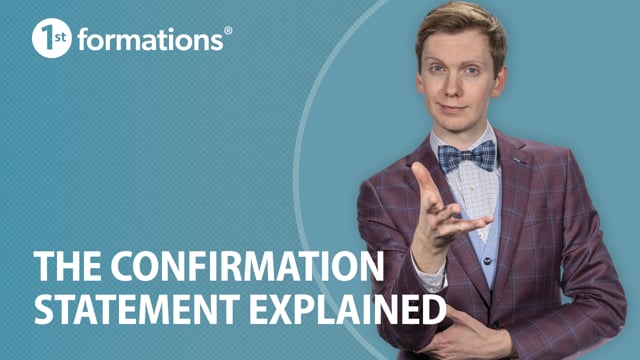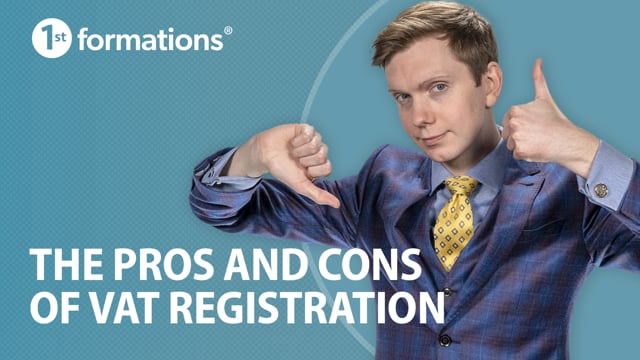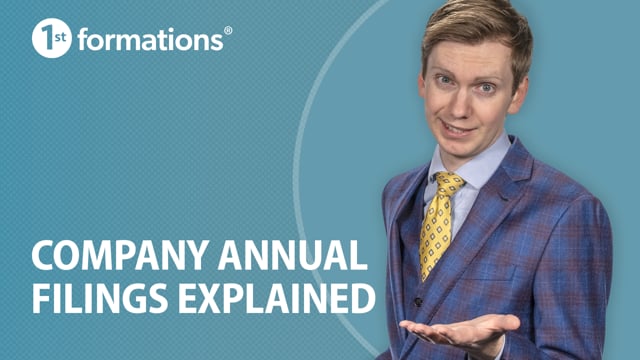A guide to annual filings
Once your new company has been successfully incorporated, you have several filing requirements for Companies House and HMRC to familiarise yourself with.
Confirmation statements
A confirmation statement is a report containing accurate and up-to-date information about a limited company on a certain date.
The purpose of filing a confirmation statement at least once every 12 months is to confirm the limited company details you have registered at Companies House and update certain key information on the company's business activities, shareholder details, share capital, and the trading status of shares.
Companies House will check the confirmation statement details against the public register and update any changes to the business activities, the shareholders' details, share capital, and share trading status, if required. Other changes should be reported separately and confirmed on the confirmation statement.
Completing a confirmation statements
A confirmation statement should be filed online or by post on Companies House form CS01 or online through your company formation agent. You will have to include the following information about your limited company or limited liability partnership:
- Company name and number
- Statement date (the date at which all information is confirmed as being correct)
- Standard Industrial Classification (SIC) codes (not applicable for LLPs)
- Share capital table (not applicable for LLPs)
- Shareholder details (not applicable for LLPs)
- Trading status of shares (not applicable for LLPs)
Company directors are responsible for completing and submitting accurate confirmation statements on time to Companies House. If a company has a secretary, the director may delegate this task to him or her, but the director is still ultimately legally responsible.
A minimum of one confirmation statement must be delivered to Companies House every 12 months. You can file as many confirmation statements as you like, provided you leave at least 24 hours in between each one. You must wait at least 48 hours after registering a company before you can file your first confirmation statement.
Filing deadline
The confirmation statement filing deadline is 14 days after the anniversary of company formation, or 14 days after the anniversary of the previous confirmation statement. The date on which you confirm that your company information is accurate and up to date is called the 'statement date'. You must enter this date on the confirmation statement and submit it to Companies House within 14 days.
Companies House imposes no automatic financial penalties for filing late confirmation statements. However, a late confirmation statement can impact your credit rating and may lead to the company being in danger of being struck off and the directors being prosecuted.
You can file a confirmation statement any time before its due date, provided the information is accurate and up to date at the statement date provided. Companies often file early statements if they want to report certain details immediately and have the information updated on the public register before their next filing deadline.
How to file a confirmation statement
Confirmation statements must be delivered to Companies House on form CS01, either online or by post. We are happy to complete and file your confirmation statement as an additional service. Please see our Confirmation Statement Service page.
Our latest videos on annual filing requirements
Company Tax Returns
A company tax return outlines the financial activity of a company during its annual Corporation Tax accounting period. It is used to show how much taxable profit (if any) a company has made over that period, and how much corporation tax it has to pay on these profits.
A Company Tax Return must use the form CT600 with figures showing how much Corporation Tax the company owes, a full set of annual (statutory) accounts, and a clear illustration of all calculations and/or computations used to reach the final figures shown in form CT600. An accountant will be able to take care of this for you if you do not want to do it yourself.
Corporation Tax accounting period
Your company's Corporation Tax accounting period will begin as soon as you start trading, which may or may not be the same day as company formation. It will usually cover a 12-month period that aligns with the financial year reported in your annual accounts. A Company Tax Return cannot cover a period in excess of 12 months, but it can cover any length of time shorter than 12 months. If your annual accounts cover more than 12 months, you must submit two tax returns: one for 12 months, and the other for the additional period.
How and when to file a Company Tax Return
You will normally only have to file one Company Tax Return every year, unless your annual accounts span a period of more than 12 months. In such cases, you will have to file two tax returns: one covering the first 12-month period and a second return for the remaining period.
If you feel able to do so, you may complete your own Company Tax Returns. You may use an accountant or tax advisor if you wish. Company Tax Returns can be complex - particularly if you have no prior experience in this area. So, it might be a good idea to find a reputable accountant to help you. If you decide to do this, you must inform HMRC.
You must file Company Tax Returns online with HMRC. If you are not using an agent, accountant, or tax advisor to complete and file tax returns on your behalf, you must enrol for Corporation Tax Online and file your own tax returns electronically through that system.
The deadline for delivering your tax return is within 12 months of the end of your company's accounting period for Corporation Tax.
Dormant companies and tax returns
If a limited company has been dormant from the date of incorporation, or from one accounting period to the next, no tax return will be required.
If a company has been active for some of its tax period, it must file a tax return to cover that period of activity.
If you plan to keep your company dormant, you'll need to inform HMRC in writing. They will then not request a tax return for your company.
Corporation Tax
Corporation Tax is money that limited companies must pay to HMRC on all taxable trading profits. It is set at a flat rate of 19%. All limited companies and non-profit organisations that are trading in the UK must pay Corporation Tax on all forms of taxable income.
How to register for Corporation Tax
Companies House will tell HMRC when your company has been incorporated. They will then send a letter to your registered office to tell you what to do next. This will include your Company Unique Taxpayer Reference (UTR). It is a 10-digit number that is used to identify your company.
If your company is trading or involved in any kind of business activity, you must register for Corporation Tax on HMRC’s website within 3 months. If your company is dormant, you should tell HMRC of this - you'll then need to inform them when you do begin trading.
To register for Corporation Tax, you must provide HMRC with the following information about your business:
- Company registration number
- The date the company started undertaking business
- The date your annual accounts are made up to
How and when to pay Corporation Tax
You must pay any tax you owe to HMRC by the statutory deadline. For companies whose profits are under £1.5m, this is 9 months and 1 day after the end of your company’s Corporation Tax accounting period. As previously mentioned, this is normally a 12-month period that aligns with the period of time covered by a company’s annual (statutory) accounts.
Your accounting period can be shorter than 12 months, but it cannot be longer. The amount of tax your company will pay depends on the amount of profit generated during its corporation tax accounting period. Companies with profits greater than £1.5m will need to pay their Corporation Tax in instalments.
You cannot pay by post. Corporation tax must be paid electronically using one of the following methods:
- Online or telephone banking
- CHAPS
- Bacs
- Direct Debit
- Online by debit or credit card
- At your bank or building society
Dormant companies and Corporation Tax
If your company has been dormant from the date of incorporation or from one accounting period to the next, you will not need to pay any Corporation Tax. If your company became dormant after a period of activity, you would have to pay corporation tax on any taxable income made before it became dormant.
Value Added Tax
Value Added Tax (VAT) is charged by VAT-registered businesses on the goods or services they sell. VAT can usually be reclaimed by VAT-registered businesses on any goods or services they pay for.
Your company will only be required to register for VAT if its VAT taxable turnover has exceeded £90,000 (VAT registration threshold 2021-22) in the previous 12 months, or your company is likely to exceed this threshold within the next 30 days.
How to register a company for VAT
You must apply to HMRC online or in writing. It may take some time for your application to be approved, so you must ensure you keep all receipts and invoices in the meantime. However, sometimes companies are registered for VAT and issued with a VAT number within just a few hours.
You can choose to voluntarily register your company for VAT. This is useful if you expect to exceed £90,000 VAT taxable turnover within the current financial year, or if your business is likely to be in a repayment position from HMRC.
VAT registration can also make your business appear more established by giving the impression that your company is of a size that requires VAT registration, so clients will think that your business is larger than it is.








